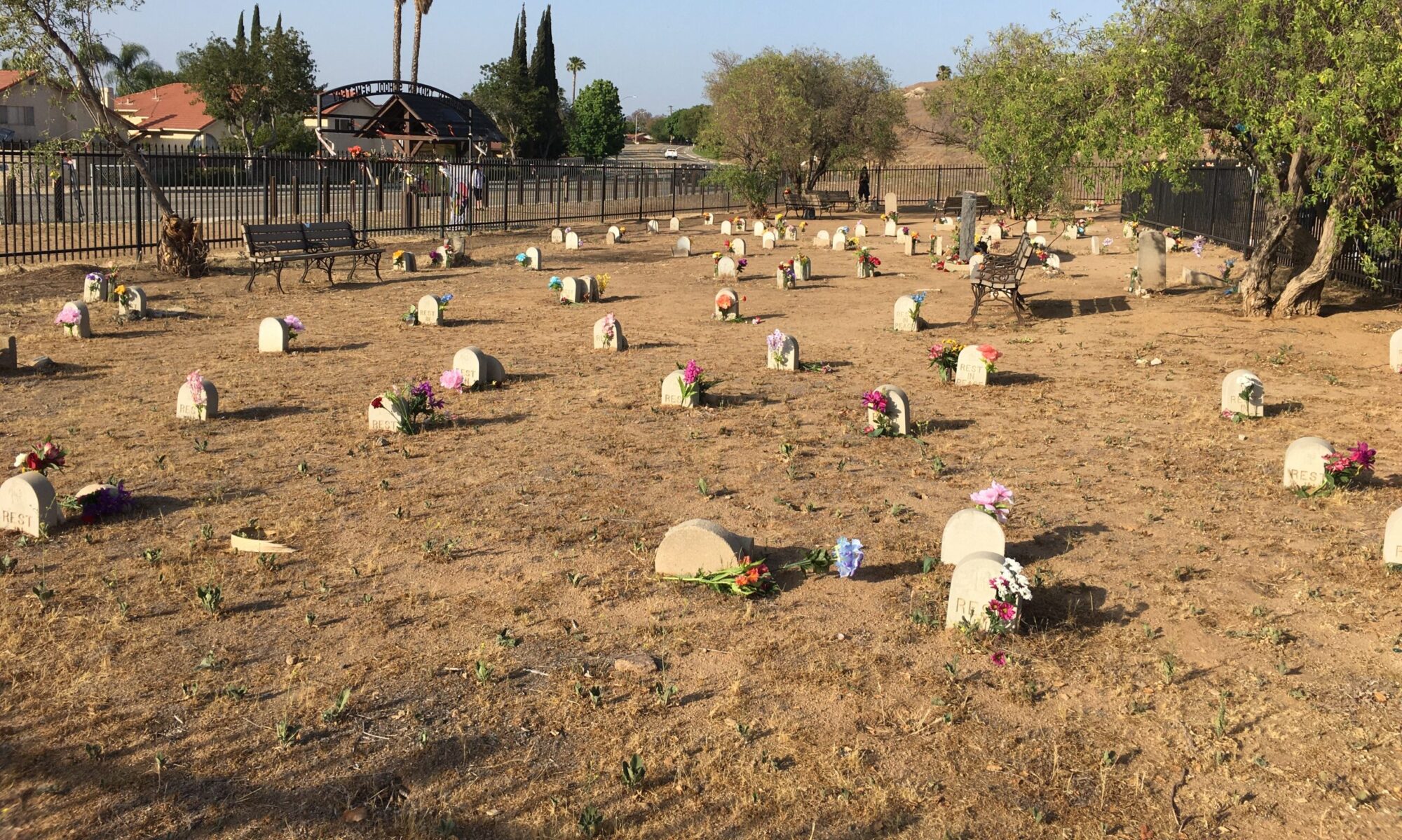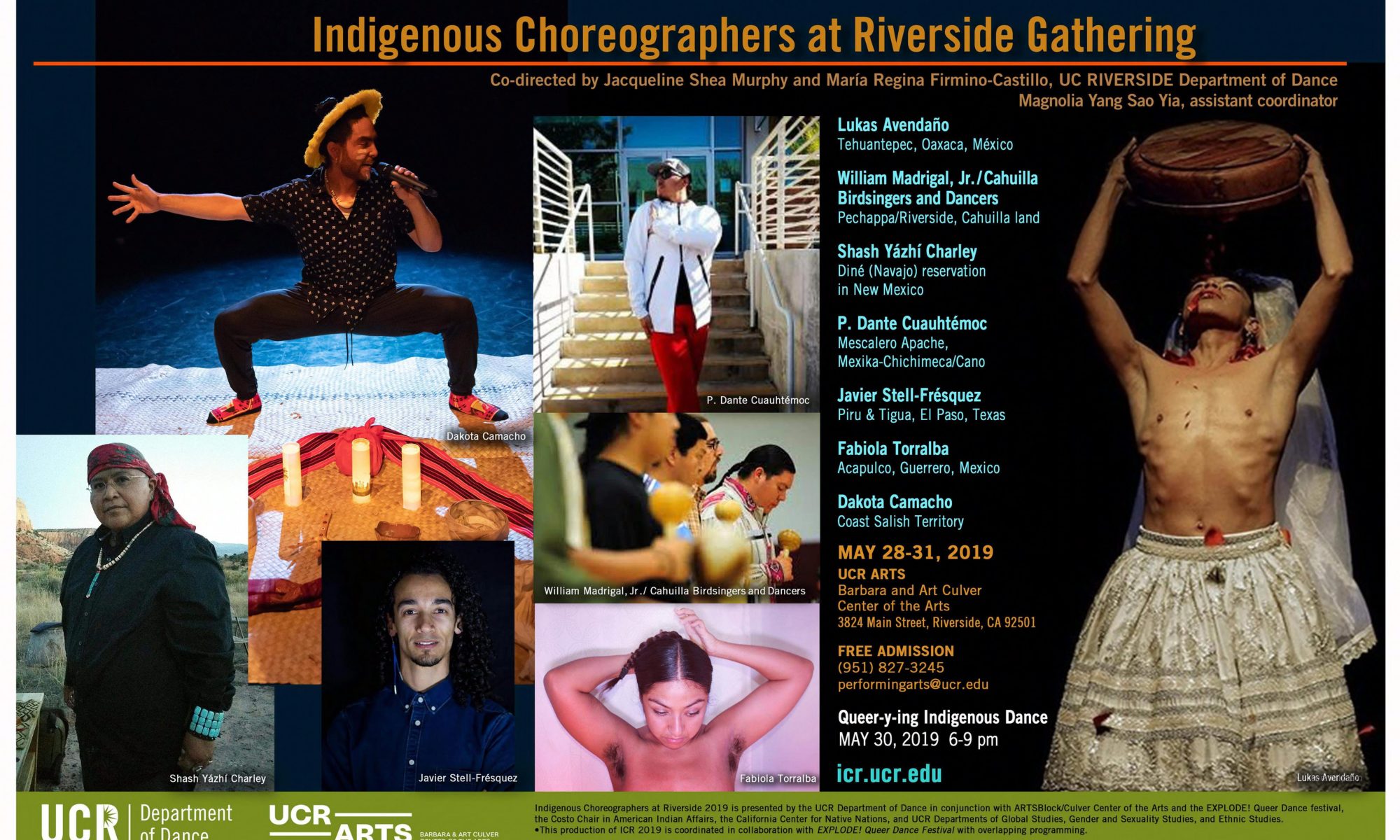Indigenous Choreographers at Riverside Gathering
Queer-y-ing Indigenous Dance
May 30, 2019
Hosted and co-directed by Jacqueline Shea Murphy and María Regina Firmino-Castillo
Magnolia Yang Sao Yia, Assistant Coordinator
Lily Chan Szeto, Event Specialist
![]()
“Queer-y-ing • Queer Indigenous Dance • Y Spanish and/also, because of trans national identity focus • Ing- A gerund, a doing or making of Indigenous dance to be something it is or is not yet • A Query” – P. Dante Cuauhtémoc
“’When did you realize that you were muxe?’ Less than Less than No One: ‘With all due respect, at what point did you not have in mind that you were a man, a woman, from the mountains or the coast, an American, an earthling? Because I have never stopped thinking about what I am, until you came and told me what I was.’” – Lukas Avendaño (translated by Kit Schluter), from “Amarranavajas“
The Indigenous Choreographers at Riverside (ICR) project is an annual event that brings Indigenous dance artists, Indigenous studies scholars, and dance studies scholars to campus to connect, discuss, and share work. We look at ways Indigenous dance, in diverse forms and locations, engages Indigenous knowledges, and the import of these articulations.
This year’s ICR gathering features workshops, roundtables, and public presentations throughout late May. The culminating event is on Thursday, May 30, 6 to 9 PM, developed in relation with the EXPLODE! Queer Dance Festival and featuring Indigenous dance artists and knowledge holders whose works engage sexual and gender diversity from a multiplicity of perspectives. Participants include: Michael Madrigal, William Madrigal and the Traditional Cahuilla Bird Singers, Lukas Avendaño, Dakota Camacho, Ernesto Colín, Jack Gray, Wesley Y. Leonard, Cynthia Ling Lee, S.J Norman, P. Dante Cuauhtémoc, Liz Przybylski, José L. Reynoso, Javier Stell-Frésquez, Rulan Tangen, Fabiola Torralba, and Shash Yázhí Charley.
OUR FUNDERS
Indigenous Choreographers at Riverside 2019 is presented by the UCR Department of Dance in conjunction with ARTSBlock/Culver Center of the Arts and the EXPLODE! Queer Dance festival, the Costo Chair in American Indian Affairs, the California Center for Native Nations, and UCR Departments of Global Studies, Gender and Sexuality Studies, and Ethnic Studies.
This production of ICR 2019 is coordinated in collaboration with EXPLODE! Queer Dance Festival with overlapping programming.
2019 SCHEDULE
Tuesday, May 28
ICR Futurities Booth with Rulan Tangen
Location: UCR, Arts Building, outside ARTS 100
4:00 – 5:00 PM
Free and open to the public.
ICR participants are invited to think about the world we want to live in, and how ICR might contribute toward it.
ICR Workshop by Lukas Avendaño
“Instalación para Cuerpo Humano / Installation for the Human Body”
Location: UCR, Arts Building, ARTS 300
5:00 – 8:00 PM
Free and open to the public with RSVP. Please RSVP HERE.
This workshop introduces Lukas Avendaño’s theory and methodology for performing “Installations for the Human Body.” Somatic training engages the specificity of embodied and virtual memory and activates corpus-as-territory to examine the body as cultural and political construct. Through the biological body and the performative body (bios-escénico), performance becomes an exercise in survival, rooted in sovereignty, inquiry, and ritualized aggression. Working with objects as extensions of the human body, corporeal sovereignties are activated to create the, “Installation for the Human Body.”
Wednesday, May 29
EXPLODE! Workshop with Jennifer Monson and DD Dorvillier
“iLANDING”
Location: UCR, Arts Building, ARTS 100
1:10 – 3:00 PM
Free and open to the public.
Longtime collaborators and improvisers Jennifer Monson and DD Dorvillier draw upon scores published in A Field Guide iLANDing: scores for researching urban ecologies. The workshop will be movement-based and help us consider how we uses our senses, histories, and orientations to environment to move alone and with one another.
EXPLODE! Workshop with Kareem Khubchandani
“Queering Bollywood Dance”
Location: UCR, Arts Building, ARTS 300
3:45 – 5:00 PM
Free and open to the public.
Scholars have long engaged with the queer possibilities of Hindi cinema, popularly known as Bollywood. However, much of the queer possibility of this very heteronormative film style lies in its dance. This session explores the range of queer possibilities in Bollywood dance: homosocial gestures on screen, artistic subversions of screen dance, trans performance in LGBT activism, and diva worship in gay nightclubs.
ICR Futurities Booth with Rulan Tangen
Location: UCR, Arts Building, outside ARTS 100
6:00 – 7:00 PM
Free and open to the public.
ICR participants are invited to think about the world we want to live in, and how ICR might contribute toward it.
ICR Workshop by Fabiola Torralba
“Shaking as Ceremonial Space” in relation to “N.I.M.R. (Negra India Morena Roach)” performance on May 30th
Location: UCR, Arts Building, ARTS 300
7:00 – 9:00 PM
Free and open to the public with RSVP. Please RSVP HERE.
This workshop demonstration will explore the significance of shaking isolated parts of the body and as a whole. Through review of movement vocabulary of communities across space and time we will address the implications of race, class, and gender in these forms. Moreover, we will uncover the intersections between Queer, Indigenous, Black, and Brown shaking bodies as sites of resistance and joy.
Thursday, May 30
ICR Gathering 2019: Queer-y-ing Indigenous Dance
“Queer-y-ing • Queer Indigenous Dance • Y Spanish and/also, because of trans national identity focus • Ing- A gerund, a doing or making of Indigenous dance to be something it is or is not yet • A Query”
– P. Dante Cuauhtémoc
Location: Culver Center of the Arts, Coil Brothers Atrium
6:00 – 9:00 PM
Free and open to the public.
ICR Futurities Booth with Rulan Tangen
ICR participants are invited to think about the world we want to live in, and how ICR might contribute toward it. The Futurities Booth will take place outside of the Culver Center of the Arts from 5:00 – 6:00 PM.
William Madrigal and the Traditional Cahuilla Bird Singers, Welcome
Shash Yázhí Charley, Opening Reflection
As a Dilbaa (Indigenous gender queer/trans) healer and guide, Shash Yázhí Charley, holds space for the embodiment of Four Direction Fire Keepers, a traditional Indigenous Dilbaa / transmasculine community.
Javier Stell-Frésquez, “Mother the Verb”
Honoring the labor and heart of mothers of all genders, Mother the Verb wrestles with the toxicity of our relationships in this post-colonial world.
“Because our nursing infants are at the top of the food chain, they inherit a body burden of industrial contaminants from our blood by way of our milk; thus are we part of the landfill, colonized.”
– Katsi Cook, Mohawk Native American Midwife/Researcher
Fabiola Torralba, “N.I.M.R. (Negra India Morena Roach)”
N.M.I.R. explores the identity of a mixed race Afro-Indigenous descendent through social dance movement. Race, sex, gender, class, and colonialism are deconstructed from the lens of a Mexican immigrant who grew up in the U.S. amongst Cumbia, Hip Hop, and Booty dance cultures. The ritual like dance performance is a means to reflect on the representation of past-present-future migrant and diaspora bodies.
Lukas Avendaño, “Réquiem para un Alcaraván”
Réquiem para un Alcaraván is a performative dance of the man-woman. Zapotec culture, through muxheidad, embraces homosexuality, gayness, and same-sex marriage with certain contradictions: the muxe is a man who assumes the labor roles–but also the affective, emotional, and sexual roles–culturally reserved for women. This makes muxheidad a veiled social acceptance, and at the same time, a celebration of what is considered a transgression. In Réquiem para un Alcaraván the Zapotec man-woman dances and invites the spectator to participate in “female rites of passage:” the traditional wedding; hosting and caring for images of Catholic saints; healing/praying; and mourning. The metamorphosis occurs when the soul incarnates in a local bird called the stone-curlew (berelele in Zapotec; alcaraván in Spanish); here, the male cycle closes once the alcaraván mates. In some cases, the male alcaraván is sacrificed by the female”
Dakota Camacho, “Sounding Circle: Listening and Being Heard”
With audience and Ernesto Colín, Wesley Y. Leonard, Cynthia Ling Lee, Michael Madrigal, S.J Norman, José Luis Reynoso, and Liz Przybylski as invited respondents.
Friday, May 31
ICR Workshop by Jack Gray
“Movement for Joy”
Location: Infuse Dance Studio, 3737 Main St. Ste 103A Riverside, CA 92501
11:00 AM – 12:15 PM
Free and open to the public with RSVP. Please RSVP HERE.
“Movement for Joy” is a 75 minute physical ‘dance’ class by Jack Gray, formulated as a response to the experience of contemporary stress-related symptoms arising from isolation, pressures and demands, a sedentary and computerized lifestyle and more. Gray is an internationally renowned choreographer, as well as a founding member and the current artistic director of Atamira Dance Company in Aotearoa (New Zealand), which creates and produces high quality Māori contemporary dance theatre . The class is a call and response to the personal and the collective body, with a range of moving sequences guided by Gray alongside the constant bpm of (pop) music. This practice evolved in collaboration with the visual arts, theatre and education staff and local community at Corban Estate Arts Centre in Auckland (where Atamira Dance Company is based) after recognizing the need for people to express themselves more without an end goal. The space aspires to be all-inclusive, and supportive of a wide range of needs (all ages/all levels of movement experience/all mobilities).
EXPLODE! Queer Dance Festival
with contribution from Zapotec muxe’ performance artist
Lukas Avendaño, “No Soy Persona. Soy Mariposa.”
Location: Culver Center of the Arts, Coil Brothers Atrium
8:00 – 10:00 PM
Free and open to the public.
Saturday, June 1
EXPLODE! Queer Dance Festival
with contribution from Zapotec muxe’ performance artist
Lukas Avendaño, “No Soy Persona. Soy Mariposa.”
Location: Culver Center of the Arts, Coil Brothers Atrium
6:00 – 8:00 PM
Free and open to the public.
Closing to EXPLODE! Queer Dance Festival
Two-Spirit Inverted L.S.S. with P. Dante Cuauhtémoc (Mescalero Apache, Mexika-Chichimeca/Cano)
This Two-Spirit Inverted Legends, Statements & Stars/Artists/Co-Conspirators/ Witnesses is “a moment to see and be seen.” Borrowed from the House Ballroom Scene and Two-Spirit traditions, and placed at our festivals’ conclusion (which is its inversion from its normal place of commencing), this is a time on a RUNWAY to honor those present who have helped our time together come to life.
2019 ARTISTS
William Madrigal and the Cahuilla (kaweeyah) Bird singers and dancers are a group that is part of a long, inter-generational tradition of culture bearers within the local California Indian community. Will and his family are members of the Cahuilla Nation of Southern California, a federally recognized Indian nation. Through life-long commitment, they have been given the gift of bird singing through oral teaching from the elders of the reservation community. They adhere to the strict protocol of the Cahuilla culture in regards to public expression and presentations. The bird songs and dances are a celebration of life for all peoples and are sung throughout southern California today.
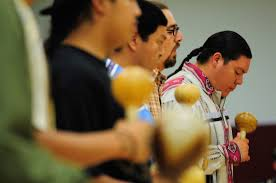
Michael Madrigal is a member of the Cahuilla Band of Indians from the Cahuilla Indian Reservation located near Anza, California. He has been a lay administrator at St. Joseph Mission at the Soboba Indian Reservation for the past 25 years. Growing up on the reservation Michael had the opportunity to learn about his tribal traditions from many elders including Katherine Saubel, Alvino Siva, Robert Levi, and Uncle Billy Mesa. Keeping vibrant the indigenous spiritual traditions of southern California tribes is one of his life vocations. Michael has also been president of the Native American Land Conservancy for the last eight years. The primary goal of the conservancy is to care for and preserve sacred landscapes for present and future generations, thereby honoring the ancient and ongoing relationship between Indigenous peoples and the land.
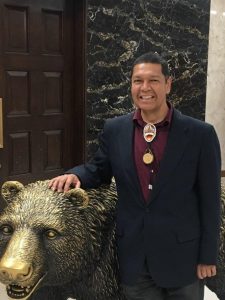
Lukas Avendaño
“I was not born in a maternity ward. My mother gave birth to me without the help of anyone. It happened on the Mexican Isthmus of Tehuantepec, the land where I grew up surrounded by other barefoot and ‘sodomitic’ (as Spanish chronicles described us) Natives. And from this land I nourished myself to do what I call ‘Installation for the Human Body.’ Some call it a happening, others call it a sketch, and still others, a provocation. Perhaps the latter is closest, for my intention is to cut against homophobia with a courageous transvestism that flirts with dance and exhibitionism as it climaxes into the word. I do this from sensuality and life, from consciousness and the body, using the Native and the modern word to disturb orthodoxies of every stripe and to show how sensitivity cuts deeper than the presumed hardness of the hard. I am well aware of the existence of borders created by politics, societies, cultures, and prejudices. This is why my corporeal installations propose borders as places of encounter, not separation; from this liminal state I stand at the vortex, with my two feet placed on both sides of being ‘man/woman,’ inhabiting reality/utopia, correct/incorrect. Perhaps this is the dichotomy that I like the most, the in/correct; here I feel free, full, true and alive. Because of this, it pleases me that my native culture not be so orthodox in the exercise of life; that is why those who visit Tehuantepec describe it as a society of matriarchs, the quasi-paradise for homosexuals, a totemic, and even ‘primitive’, place.”
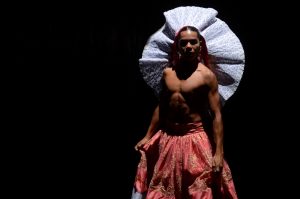
Photo credit: Edson Caballero Trujillo
Dakota Camacho is a multi-disciplinary artist / researcher working in spaces of indigenous life ways, performance, musical composition, community engagement, and education. Guiya (they) ground yo’-ña (their) creativity in ancestral life ways. Born and raised in Coast Salish Territory, Camacho’s work weaves knowing from both yo’-ña bloodlines and the diverse lineages that inform yo’-ña indigenizing journey. The work aims to proliferate inafa’maolek — unifying human consciousness with the natural world, restoring balance with the elements, and living with life force.
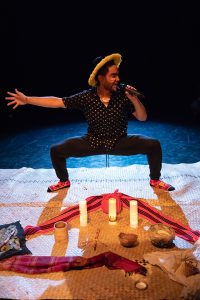
Dr. Ernesto Colín is a visual artist, Aztec dancer, and Associate Professor in the Department of Teaching & Learning at Loyola Marymount University in Los Angeles, California. He holds B.A.’s in Chicana/o Studies and Spanish, and an M.A. in Secondary Education. He received his PhD in Anthropology of Education from Stanford University and his research interests include indigenous education, culturally responsive pedagogy, and teacher education. His latest book, Indigenous Education Through Dance and Ceremony (Palgrave), is a long-term ethnography of an Aztec Dance group in California.
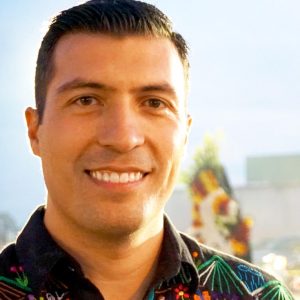
Jack Gray is a New Zealand Maori contemporary dance artist of Te Rarawa, Ngāpuhi, Ngāti Whātua, Ngāti Kahungunu and Ngāti Porou descent. Jack became the Artistic Director of Atamira Dance Company in January 2018 and a Regent Lectureship Scholar at UCLA this Spring.
In the past two years he developed and toured I Moving Lab throughout the U.S, creating transformative community relationships through Intercultural Indigenous exchange.
Jack’s major work with Atamira includes a full length dance work Mitimiti made over five years. Alongside his choreographic work he has published articles in dance and academic publications (in collaboration with Professor Jacqueline Shea Murphy) and has been a cultural consultant, facilitator, dramaturg, rehearsal director and teacher (at UCR in Spring 2014).
https://www.atamiradance.co.nz
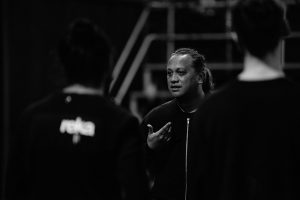
Wesley Y. Leonard received his Ph.D. in Linguistics at the University of California, Berkeley, and is currently an assistant professor of Ethnic Studies at the University of California, Riverside. His primary research examines and theorizes sociopolitical factors that are intertwined with Native American language endangerment, documentation, and reclamation. A citizen of the Miami Tribe of Oklahoma, he focuses in particular on the reclamation of his tribal nation’s language, myaamia (Miami), and on building capacity for Native American languages in ways that support tribal sovereignty and survivance. A collaborative project that he co-chairs, Natives4Linguistics, promotes Indigenous needs and intellectual tools as ways of doing linguistic science. His work has appeared in scholarly outlets including the American Indian Culture and Research Journal, Gender and Language, Language Documentation & Conservation, and Language Documentation and Description.
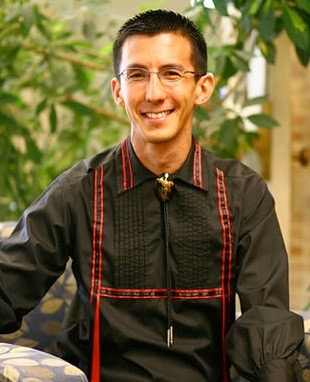
Cynthia Ling Lee is a Taiwanese American performance troublemaker who instigates queer, postcolonial, and feminist-of-color interventions in the field of Asian diasporic performance. Trained in North Indian classical kathak and US postmodern dance, she is committed to intimate, ethical collaborative processes and foregrounding marginalized voices and aesthetics. Cynthia’s interdisciplinary choreography has been presented at venues such as Dance Theater Workshop (New York), REDCAT (Los Angeles), Painted Bride Arts Center (Philadelphia), Links Hall (Chicago), SZENE Salzburg (Salzburg), Taman Ismail Marzuki (Jakarta), and Chandra-Mandapa: Spaces (Chennai). Recent publications include co-written chapters with Sandra Chatterjee in Dance Matters Too: Markets, Memories, Identities (2018, Routledge) and Queer Dance: Meanings and Makings (2017, OUP). Cynthia was the recipient of a Thomas J. Watson Fellowship, an Asia-Pacific Performing Arts Exchange Fellowship, a NET/TEN grant, a Taipei Artist Village Residency, and a Hellman Fellowship. Influential teachers and mentors include Simone Forti, Eiko & Koma, Judy Mitoma, Pallabi Chakravorty, Bandana Sen, Kumudini Lakhia, Anjani Ambegaokar, and the contact improvisation community. Cynthia is an assistant professor of dance in the Department of Theater Arts at UC Santa Cruz and a member of the Post Natyam Collective. www.cynthialinglee.com
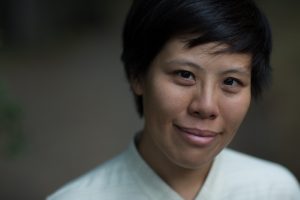
S.J Norman (b. 1984) is an inter-disciplinary artist and writer. Their artistic trajectory has so far spanned 13 years and has been informed by a diverse range practices, disciplines and methodologies, and incorporates solo and ensemble performance, installation, sculpture, text, video and sound. Working extensively with durational and endurance practices, as well as intimate/one-to-one frameworks, Norman’s primary medium is the body: the body as a spectacle of truth and a theatre of fantasy; a siphon of personal and collective memory; an organism with which we are infinitely familiar and eternally estranged; a site which is equally loaded and empty of meaning, where histories, narratives, desires and discourses converge and collapse. They are a non-binary transgender person and a diasporic Koori, born on Gadigal land (with familial and ancestral connections to Wiradjuri, Wonnaruah and Ngyiampaa lands); as such, their practice is routed through the volatile interstices of the social and the corporeal. Norman seeks through much of their work to implicate the body of the audience and the body of the performer as co-agents in magickal acts, through which they seek to forge hybrid languages of ritual and queer de-colonial knowledge-making.
Norman has toured, exhibited, performed and spoken about their work at Venice International Performance Week (IT), Spill Festival of Live Art (UK), Fierce Festival (UK), In Between Time (UK), Arnolfini (UK), Performance Space, Sydney (AU), the Australian Experimental Art Foundation (AU), , Melbourne Festival (AU), Dancehouse (AU), Tarnanthi Festival of Aboriginal and Torres Strait Islander Art (AU) and Tate Modern (UK), the Science Gallery London (UK), Die Fabrikanten (AT), Liveworks (AU), and Performance Space New York (US) to name a few. They have received numerous honours for both their art and their writing, most recently a Sidney Myer Creative Fellowship.
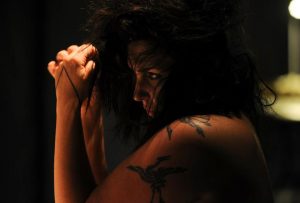
P. Dante Cuauhtémoc (Mescalero Apache, Mexika-Chichimeca/Cano ) is a fourth-year Critical Dance Studies Ph.D. student at the University of California, Riverside (UCR). Their academic studies have been supported by the U.S. Department of Education Native American Studies Graduate Assistance in Areas of National Need (G.A.A.N.N.) Fellowship, the Dean’s Distinguished Doctoral Student Fellowship, and the Max H. Gluck Arts Fellowship. Their research focuses on the history of the United States’ House Ballroom Scene, in particular the West Coast Ballscene, and its involvement in how queer and two-spirit Native Americans of the Western Hemisphere have deployed the dance form of vogue (voguing/Performance) as a method of decolonization, anti-colonialism, transformational resilience, and queer Indigenous knowledge reclamation.
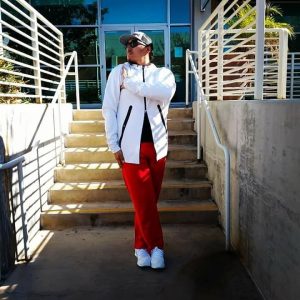
Photo credit: House of Lauren
As an interdisciplinary scholar of popular music, Liz Przybylski specializes in Indigenous hip hop practices in Canada and the United States. A graduate of Bard College (BA) and Northwestern University (MA, PhD), Liz’s work bridges ethnomusicology, musicology, gender studies, and Indigenous Studies. She has presented her research nationally and internationally, including at the Society for Ethnomusicology, Feminist Theory and Music, International Association for the Study of Popular Music, and International Council for Traditional Music World Conferences. Recent and forthcoming publications analyze how the sampling of heritage music in Indigenous hip hop contributes to dialogues about cultural change in urban areas. Liz has also published on popular music pedagogy. She was awarded a Fulbright Fellowship to conduct research with hip hop artists and music broadcasters in Winnipeg. Her ongoing work develops an innovative model of on- and off-line ethnography for the analysis of contemporary popular music. In addition to her university teaching, Liz has taught adult and pre-college learners at the American Indian Center in Chicago and the Concordia Language Villages program of Concordia College in Bemidji. A radio enthusiast, Liz hosted the world music show “Continental Drift” on WNUR in Chicago and has conducted interviews with musicians for programs including “At The Edge of Canada: Indigenous Research” on CJUM in Winnipeg. Liz currently serves as the Vice President of the Society for Ethnomusicology, Southern California and Hawaii Chapter and as the Media Reviews Editor for the journal American Music.
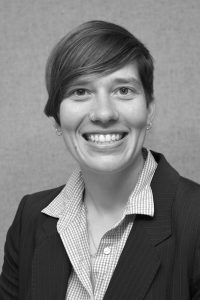
José Luis Reynoso, dance scholar, performer, and choreographer, is Assistant Professor of Critical Dance Studies at UCR. Dr. Reynoso was the Andrew Mellon Postdoctoral Fellow in Dance Studies at Northwestern University (2012-2014). He completed his Ph.D. in Culture and Performance with a specialization in Dance Studies (2012) and a M.F.A in Choreography (2006) at UCLA. He also holds a M.A. (2003) and a B.A. (2000) in Psychology from California State University Los Angeles.
Dr. Reynoso writes and teaches about the history, theory, and practice of dance and other forms of cultural production focusing primarily on the U.S., Mexico, and other countries in Latin America. His interests focus on the roles that corporeality in general and dance in particular play in the production of knowledge and subjectivity. His work investigates ideological and political discourses embodied in dance making as well as in the formation of artistic identifications. It also examines how race, class and gender participate in the production of notions of post/modernity, post/modernism, and “contemporary Art.” His book project explores the role that concert dance and vernacular forms of expressive cultures played in twentieth-century processes of modernization in post-revolutionary Mexico as these art forms converged to produce distinctive embodied “mestizo” modernisms.
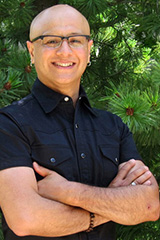
Javier Stell-Frésquez (Piru & Tigua Native American from El Paso, Texas) serves Indigenous communities of the Bay, on the Two-Spirits Powwow, and will co-produce a Two-Spirit performance festival in Spring of 2020 at CounterpulseSF. With life-long experience in many dance forms, and, more recently, vogue and performance art, she competes in the voguing House Ballroom Scene as “Xav ome’Lauren,” a member of the House of Lauren. She received a B.S. in Environmental Science with honors in Chican@ Studies from Stanford University. He also tours Mother the Verb internationally (next performance June 19 as part of the National Queer Arts Festival).

Rulan Tangen‘s work explores movement as an evolving language of intertribalism rooted in diverse indigenous cosmologies, in functional ritual for transformation and healing, animating decolonization process, integrating concurrent universes of ancient futurities in the moment of now, expressing energetic connection with all relations – human and beyond. As Founding Artistic Director/Choreographer of DANCING EARTH, she has passionately cultivated successive generations of Indigenous contemporary performing artists as cultural ambassadors and conduits for social change.. She is recipient of 2018 Kennedy Center Citizen Artist award for Service, Justice, Freedom, Courage, and Gratitude – and is grateful for all that roots her, for the dreaming and doing of Dancing Earth : moving, shaking and stomping the world into renewal.
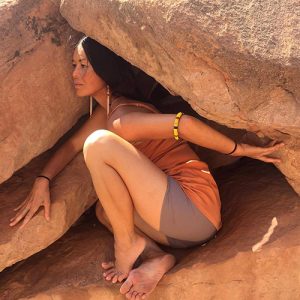
Photo by Uqualla for DANCING EARTH , location Abaachi lands
Fabiola Ochoa Torralba is an immigrant who was born in Acapulco, Guerrero, Mexico and raised in the Westside of San Antonio, Texas. Her experience as a grassroots organizer and cultural arts worker has led to unique collaborations with artists, schools, galleries, and non-profit organizations for dancers ranging from inner city youth to senior citizens, refugees, Spanish speakers, LGBTQ groups, and fine arts students. Her research explores intersectional politics, decolonial epistemologies, and (im)migrant identities. They enjoy facilitating dance making opportunities for movers of all backgrounds that explore the relationship between performance and action.
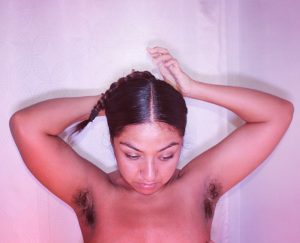
Shash Yázhí Charley, was raised on the Diné (Navajo) reservation in New Mexico. For the last 28 years Shash Yázhí, has implemented traditional Diné practices through working with activists and individuals who wish to create internal healing and balance in their lives. Shash Yázhí conducts individual sessions towards liberation and transformation to promote integrating and connecting the mind, body, heart and spirit.
Shash Yázhí Charley has been at the forefront of advocating for LGBTQ-Two Spirit equality and justice. Currently Shash Yázhí is holding space of embodying a traditional gender society called Four Direction Fire Keepers – Dilbaa and Indigenous gender queer/trans male.
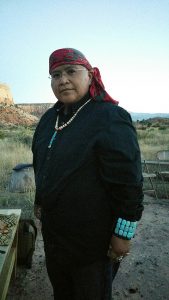
Poster design: Kathleen DeAtley
